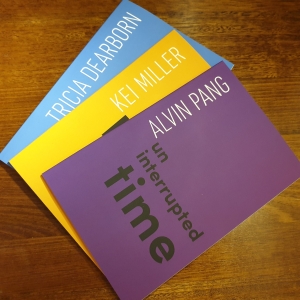
What a fabulous weekend!
It’s been another great day, which began at the National Portrait Gallery again for ‘Mornings at the NPG: Kei Miller and Tricia Dearborn’. As well as listening to these two amazing poets read some of their work, Kei and Tricia talked about the importance of sound in poetry. Kei said that he tries to write the rhythms of the places he writes about. You will also find iambic lines within his poetry, just to prove that he can. He said that as a Jamaican writer he has some anxieties around proving that he can use the language of the coloniser. He also likes to break the traditional rhythms of English poetry. Tricia said that she more tries to write the rhythms of the self, internal rhythms. Owen Bullock asked what are the topics that are underrepresented in poetry. The audience came up with a few topics, including: menopause, child birth, all women’s experiences, autism and ugliness.
I enjoyed a walk around the National Portrait Gallery. I was particularly drawn to the portrait of Judith Wright with Barbara Blackman by Charles Blackman.
The next session was ‘the science of poetry’ with Katharine Coles, Tricia Dearborn, Anne Elvey and Bronwyn Lovell. What an interesting group of women and, as Paul Munden pointed out, how wonderful to have an all female panel speaking about science in poetry, particularly after the first all-women space walk. It was wonderful to listen to these highly intelligent group of women speaking about their scientific and mathematical research and the role that poetry can have in communicating science.
The next session was ‘what’s the use of poetry’ with Jen Crawford, Martin Dolan, Caren Florance and Mani Rao. Martin read a few poems out in exploring this topic, including ‘Question Time’ by Meena Alexander. Martin’s point was that poetry does not need to have a utilitarian function, it can be devoid of use. He also quoted from W.H. Auden’s ‘In Memory of W.B. Yeats’, “The words of a dead man / Are modified in the guts of the living.” He likes the idea that poetry lives on through the reading of it. Mani said we write poetry because our lives depend on it. She sees poetry as a body, one of her bodies, part of her body. She talked about the koshas – 5 layers of being. Caren said that we write to understand the world. She said that visual artists often pretend that they sit outside of text, but they rely on it, taking inspiration from it. Text is used to justify / explain art. Jen said that while people are doing poetry they aren’t doing other things and maybe there’s some value in that. She described poetry as survival. Jen Webb, the host of the panel, summed up, “poetry can remind us that none of us have rights”.
In discussing the cathartic / emotional work that poetry does Mani said that she has discovered many things about herself that she didn’t know as she was writing. Jen C said “poetry can be therapy, but it’s not confidential. It takes us away from our isolation… we carry each other along when we do share.” Martin described poetry as being rather like music, saying that it can bypass the cognitive and get to the feelings. Jen Webb agreed with Caren, “poetry is better than cutting yourself”.
Alvin Pang asked does poetry need a use? In this utilitarian world we live in is it not a defiant act to indulge in something like poetry that does not have a use?
Finally, Jen Webb concluded that poetry gets us to ask questions, it opens doors.
The day ended with more Poetry@Smith’s. It was lovely to listen to Louise Crisp, Anne Elvey, Alyson Miller, Alvin Pang and Mani Rao read their poetry.